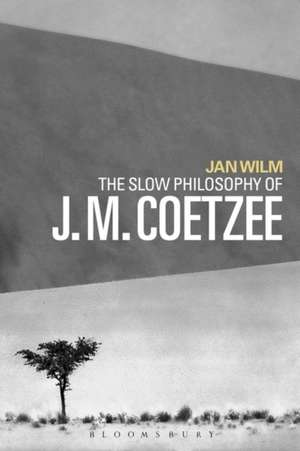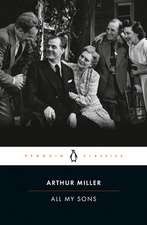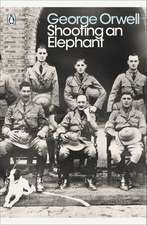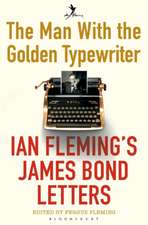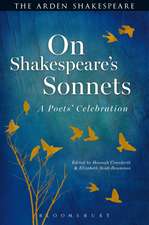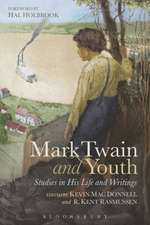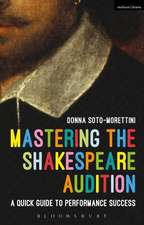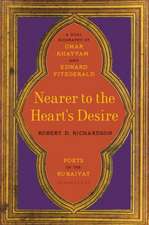The Slow Philosophy of J. M. Coetzee
Autor Dr Jan Wilmen Limba Engleză Paperback – 27 dec 2017
| Toate formatele și edițiile | Preț | Express |
|---|---|---|
| Paperback (1) | 237.93 lei 6-8 săpt. | |
| Bloomsbury Publishing – 27 dec 2017 | 237.93 lei 6-8 săpt. | |
| Hardback (1) | 715.73 lei 6-8 săpt. | |
| Bloomsbury Publishing – 15 iun 2016 | 715.73 lei 6-8 săpt. |
Preț: 237.93 lei
Preț vechi: 272.88 lei
-13% Nou
Puncte Express: 357
Preț estimativ în valută:
45.53€ • 47.66$ • 37.67£
45.53€ • 47.66$ • 37.67£
Carte tipărită la comandă
Livrare economică 05-19 aprilie
Preluare comenzi: 021 569.72.76
Specificații
ISBN-13: 9781350056299
ISBN-10: 1350056294
Pagini: 264
Dimensiuni: 233 x 157 x 21 mm
Greutate: 0.37 kg
Ediția:NIPPOD
Editura: Bloomsbury Publishing
Colecția Bloomsbury Academic
Locul publicării:London, United Kingdom
ISBN-10: 1350056294
Pagini: 264
Dimensiuni: 233 x 157 x 21 mm
Greutate: 0.37 kg
Ediția:NIPPOD
Editura: Bloomsbury Publishing
Colecția Bloomsbury Academic
Locul publicării:London, United Kingdom
Caracteristici
Develops a new method of 'slow reading' particularly geared toward an analysis of Coetzee's complex oeuvre, but which may be applied in other contexts in academic as well as general reading.
Notă biografică
Jan Wilm is a Lecturer in English Literature at Goethe University Frankfurt, Germany. He is co-editor, with Mark Nixon, of Samuel Beckett und die deutsche Literatur (2013).
Cuprins
1. Teacher of Slow Reading - An Introduction2. I do not normally write in a rushed manner - Coetzee as a Slow Writer3. A goblin: why? - Coetzee's Questions4. The sentence he will recognize at once - Coetzee's Slowing Syntax5. Meerlust - Coetzee and Literalness6. We make a leap - Coetzee's Gaps7. The legacy of Socrates - Dialogue in and with Coetzee8. A strange ending to a strange talk - Coetzee's Open-Ended Endings9. An empty cube - Coetzee's Irreal Worlds10. When all else fails, philosophize - A Philosophizing ConclusionBibliographyIndex
Recenzii
[An] excellent new book ... Wilm shows that [Coetzee's] books "go beyond the mere provision of philosophical topics" and reveal their import through an act of "slow reading".
By elaborating an approach that is at once both intriguingly conventional (slow reading) and excitingly innovative (slow philosophising), Wilm's work constitutes a nuanced addition to the burgeoning field of Coetzee Studies, making the monograph exemplary of the work of that which Coetzee terms the 'truly creative critic'.
"Slowness is Beauty": Pound's Cantos echo Binyon's dictum and turn it into a modernist motto. Jan Wilm's alert and thoughtful book energizes the motto by joining fictional syntax and philosophical meditation in patient analyses of the manuscripts. The craft of slowness is shown to underpin the work of Coetzee as he rethinks high modernism. The point is to frustrate a naïve wish to rush to conclusions or reach simple ideas about life, ethics and aesthetics. By learning to read more slowly, we read up on a dauntingly complex world, letting its beauty shine while discriminating between equivocal values.
Since the publication of Elizabeth Costello (2003), a lively conversation has developed around Coetzee in philosophy, and philosophy in Coetzee. Jan Wilm brings a new dimension to this debate in The Slow Philosophy of J.M. Coetzee, showing in a series of refreshing readings how the philosophical and the literary come together in a single experience of slow reading. Both erudite and accessible, and drawing fresh insights from Coetzee's archive, Wilm provides an original account of the Nobel laureate's distinctively meditative fiction.
Joining advocates for slow food and slow cinema, Wilm (Goethe Univ. Frankfurt, Germany) offers a challenging proposal for "slow philosophy" as seen in the work of South African Nobel Prize novelist J. M. Coetzee. In critiquing Coetzee's work, Wilm provides a slow-reading methodology that can be adapted to reading in general. The author sets out his goals in his lively introduction: to explore "how Coetzee's oeuvre probes the functions and effects of slowness" and how it "bears on the characters' and ... the readers' reflections." To accomplish this, Wilm delves into Coetzee's prose style, examining the ways in which Coetzee deploys syntax, dialogue, rhetorical questions, gaps in the narrative, metafiction, and ambiguous endings to slow the reader's progress through the text and to engender meditation and meaning making. The novels that receive particular attention are Disgrace, Foe, Life and Times of Michael K, Slow Man, and Coetzee's fictionalized memoir trilogy (Boyhood, Youth, and Summertime). The persuasiveness of Wilm's arguments is bolstered by his extensive use of Coetzee's own notebooks and drafts, housed in the archives of the University of Texas. These documents enable Wilm to trace the deliberations and revisions Coetzee makes as a writer, his slowness of method. Summing Up: Highly recommended. Lower-division undergraduates through faculty.
[Wilm] presents his insightful thoughts in a style that is elegant, very accessible, and most refreshing in shunning any academic jargon. The implications of his study certainly go far beyond the works of J.M. Coetzee only; the introduction in particular provides a guide to a careful good reading that is of universal significance and reminds us of literature's value.
By elaborating an approach that is at once both intriguingly conventional (slow reading) and excitingly innovative (slow philosophising), Wilm's work constitutes a nuanced addition to the burgeoning field of Coetzee Studies, making the monograph exemplary of the work of that which Coetzee terms the 'truly creative critic'.
"Slowness is Beauty": Pound's Cantos echo Binyon's dictum and turn it into a modernist motto. Jan Wilm's alert and thoughtful book energizes the motto by joining fictional syntax and philosophical meditation in patient analyses of the manuscripts. The craft of slowness is shown to underpin the work of Coetzee as he rethinks high modernism. The point is to frustrate a naïve wish to rush to conclusions or reach simple ideas about life, ethics and aesthetics. By learning to read more slowly, we read up on a dauntingly complex world, letting its beauty shine while discriminating between equivocal values.
Since the publication of Elizabeth Costello (2003), a lively conversation has developed around Coetzee in philosophy, and philosophy in Coetzee. Jan Wilm brings a new dimension to this debate in The Slow Philosophy of J.M. Coetzee, showing in a series of refreshing readings how the philosophical and the literary come together in a single experience of slow reading. Both erudite and accessible, and drawing fresh insights from Coetzee's archive, Wilm provides an original account of the Nobel laureate's distinctively meditative fiction.
Joining advocates for slow food and slow cinema, Wilm (Goethe Univ. Frankfurt, Germany) offers a challenging proposal for "slow philosophy" as seen in the work of South African Nobel Prize novelist J. M. Coetzee. In critiquing Coetzee's work, Wilm provides a slow-reading methodology that can be adapted to reading in general. The author sets out his goals in his lively introduction: to explore "how Coetzee's oeuvre probes the functions and effects of slowness" and how it "bears on the characters' and ... the readers' reflections." To accomplish this, Wilm delves into Coetzee's prose style, examining the ways in which Coetzee deploys syntax, dialogue, rhetorical questions, gaps in the narrative, metafiction, and ambiguous endings to slow the reader's progress through the text and to engender meditation and meaning making. The novels that receive particular attention are Disgrace, Foe, Life and Times of Michael K, Slow Man, and Coetzee's fictionalized memoir trilogy (Boyhood, Youth, and Summertime). The persuasiveness of Wilm's arguments is bolstered by his extensive use of Coetzee's own notebooks and drafts, housed in the archives of the University of Texas. These documents enable Wilm to trace the deliberations and revisions Coetzee makes as a writer, his slowness of method. Summing Up: Highly recommended. Lower-division undergraduates through faculty.
[Wilm] presents his insightful thoughts in a style that is elegant, very accessible, and most refreshing in shunning any academic jargon. The implications of his study certainly go far beyond the works of J.M. Coetzee only; the introduction in particular provides a guide to a careful good reading that is of universal significance and reminds us of literature's value.
